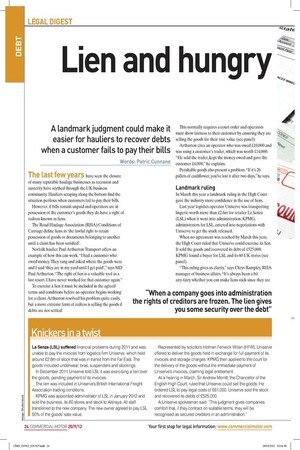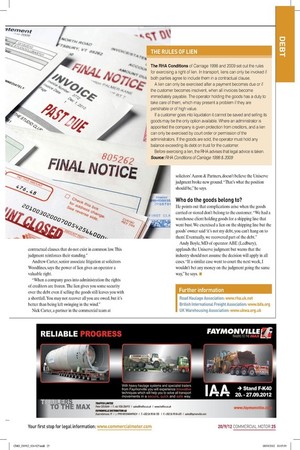Lien and hungry
Page 18

Page 19

If you've noticed an error in this article please click here to report it so we can fix it.
A landmark judgment could make it easier for hauliers to recover debts when a customer fails to pay their bills
Words: Patric Cunnane The last few years have seen the closure of many reputable haulage businesses as recession and austerity have scythed through the UK business community. Hauliers scraping along the bottom ind the situation perilous when customers fail to pay their bills.
However, if bills remain unpaid and operators are in possession of the customer’s goods they do have a right of redress known as liens.
The Road Haulage Association (RHA) Conditions of Carriage deine liens as ‘the lawful right to retain possession of goods or documents belonging to another until a claim has been satisied’ .
Norfolk haulier Paul Arthurton Transport offers an example of how this can work. “I had a customer who owed money. They rang and asked where the goods were and I said ‘they are in my yard until I get paid’ , ” says MD Paul Arthurton. “The right of lien is a valuable tool as a last resort. I have never worked for that customer again.” To exercise a lien it must be included in the agreed terms and conditions before an operator begins working for a client. Arthurton resolved his problem quite easily, but a more extreme form of redress is selling the goods if debts are not settled. This normally requires a court order and operators must show fairness to their customer by ensuring they are selling the goods for their true value (see panel).
Arthurton cites an operator who was owed £10,000 and was using a customer’s trailer, which was worth £14,000. “He sold the trailer, kept the money owed and gave the customer £4,000,” he explains.
Perishable goods also present a problem. “If it’s 26 pallets of caulilower, you’ve lost it after two days,” he says.
Landmark ruling
In March this year a landmark ruling in the High Court gave the industry more conidence in the use of liens.
Last year logistics operator Uniserve was transporting lingerie worth more than £2.6m for retailer La Senza (LSL) when it went into administration. KPMG, administrators for LSL, entered into negotiations with Uniserve to get the stock released.
When no agreement was reached by March this year, the High Court ruled that Uniserve could exercise its lien. It sold the goods and recovered its debt of £525,000. KPMG found a buyer for LSL and its 60 UK stores (see panel).
“This ruling gives us clarity,” says Chrys Rampley, RHA manager of business affairs. “It’s always been a bit airy-fairy whether you can make liens stick since they are contractual clauses that do not exist in common law. This judgment reinforces their standing.” Andrew Carter, senior associate litigation at solicitors Woodfnes, says the power of lien gives an operator a valuable right.
“When a company goes into administration the rights of creditors are frozen. The lien gives you some security over the debt even if selling the goods still leaves you with a shortfall. You may not recover all you are owed, but it’s better than being left swinging in the wind.” Nick Carter, a partner in the commercial team at solicitors’ Aaron & Partners, doesn’t believe the Uniserve judgment broke new ground. “That’s what the position should be,” he says.
Who do the goods belong to?
He points out that complications arise when the goods carried or stored don’t belong to the customer. “We had a warehouse client holding goods for a shipping line that went bust. We exercised a lien on the shipping line but the goods’ owner said ‘it’s not my debt, you can’t hang on to them’. Eventually, we recovered part of the debt.”
Andy Boyle, VID of operator ABE (Ledbury), applauds the Uniserve judgment but warns that the industry should not assume the decision will apply in all cases. “If a similar case went to court the next week, I wouldn’t bet any money on the judgment going the same way,” he says. ■
Knickers in a twist
La Senza (LSL) suffered financial problems during 2011 and was unable to pay the invoices from logistics firm Uniserve, which held around £2.6m of stock that was in transit from the Far East. The goods included underwear, bras, suspenders and stockings.
In December 2011 Uniserve told LSL it was exercising a lien over the goods, pending payment of its invoices.
The lien was included in Uniserve’s British International Freight Association trading conditions.
KPMG was appointed administrator of LSL in January 2012 and sold the business, its 60 stores and stock to Alshaya. All staff transferred to the new company. The new owner agreed to pay LSL 50% of the goods’ sale value. Represented by solicitors Holman Fenwick Willan (HFW), Uniserve offered to deliver the goods held in exchange for full payment of its invoices and storage charges. KPMG then applied to the court for the delivery of the goods without the immediate payment of Uniserve’s invoices, claiming legal entitlement.
At a hearing in March, Sir Andrew Morritt, the Chancellor of the English High Court, ruled that Uniserve could sell the goods. He ordered LSL to pay legal costs of £61,000. Uniserve sold the stock and recovered its debts of £525,000.
A Uniserve spokesman said: “This judgment gives companies comfort that, if they contract on suitable terms, they will be recognised as secured creditors in an administration.”
THE RULES OF LIEN
The RHA Conditions of Carriage 1998 and 2009 set out the rules for exercising a right of lien. In transport, liens can only be invoked if both parties agree to include them in a contractual clause.
A lien can only be exercised after a payment becomes due or if the customer becomes insolvent, when all invoices become immediately payable. The operator holding the goods has a duty to take care of them, which may present a problem if they are perishable or of high value.
If a customer goes into liquidation it cannot be saved and selling its goods may be the only option available. Where an administrator is appointed the company is given protection from creditors, and a lien can only be exercised by court order or permission of the administrators. If the goods are sold, the operator must hold any balance exceeding its debt on trust for the customer.
Before exercising a lien, the RHA advises that legal advice is taken. Source: RHA Conditions of Carriage 1998 & 2009
Further information
Road Haulage Association: www.rha.uk.net British International Freight Association: www.bifa.org UK Warehousing Association: www.ukwa.org.uk













































